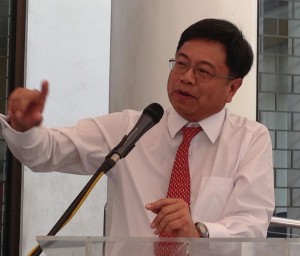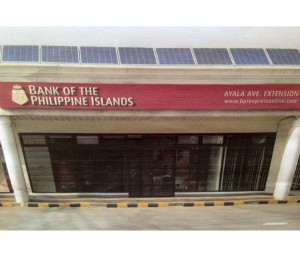BPI taps solar energy
MANILA, Philippines–Ayala-led Bank of the Philippine Islands has pioneered the use of solar technology to power selected branches to help curb costs and stabilize supply of electricity.
The first among its branches to use such solar panels, which are expected to reduce monthly electricity bill by about 20 percent, is BPI Ayala Avenue Extension which now sports in its roof a row of metallic panels that capture solar energy.
Newly appointed BPI president Cezar Consing led bank officials in inaugurating the use of solar technology in this branch on Friday.
“Savings is important but more important than savings in a growing economy is supply. Sooner or later, (electricity) supply might be an issue,” Consing said. With the resurgence in the country’s manufacturing sector, demand for power may grow faster than supply and because it takes two to three years for new power generating plants to get onstream, he said it’s possible that some power outages could occur in the future.
“For us as a bank, we can’t afford that,” Consing said, adding that the adoption of solar energy in some branches would thus have a number of advantages – savings, additional supply, enhancing value for the bank and for shareholders.
BPI may also be able to generate revenues in the foreseeable future by selling the solar energy during weekends – when there are no office operations – once the rule on “net metering” is issued.
Net metering is a consumer-based renewable energy incentive whereby consumers who own renewable energy facilities such as wind, solar power or home fuel cells receives retail credit for a portion of the electricity they generate if they interconnect their renewable generator to the grid.
“It’s a great start. I hope we could do more,” Consing said.
“We’re exploring solar energy systems for branches that are off-grid or those that do not have regular or stable sources of power,” said BPI senior vice president Florendo Manahan, likewise the executive director of BPI Foundation.
Among these branches where BPI is considering to deploy solar panels are those in Boracay, El Nido, Coron and Panglao.
Investment in solar panel is worth around P100,000 to P150,000 for every kilowatt of generated power but Maranan said it’s a way to hedge against electricity costs which are expected to rise by about 10 to 15 percent a year. As such, he said the investment could be recouped for as short as five years.
“But beyond the cost, I think it’s important to look at this endeavor as a commitment,” Maranan said.
Not all branches can adopt solar technology. BPI Ayala Avenue extension branch was chosen as the pilot branch because it’s a stand-alone structure which isn’t surrounded by tall buildings. As such, sunlight can freely be caught by the solar panels.
“We want to showcase the best green practices in a single branch so that we can demonstrate the benefits that can be derived from the strategy,” Maranan said. “In fact, this same branch will also be the pilot for our other green initiatives, such as LED signage, rainwater harvesting and inverter air-conditioning units.”
















